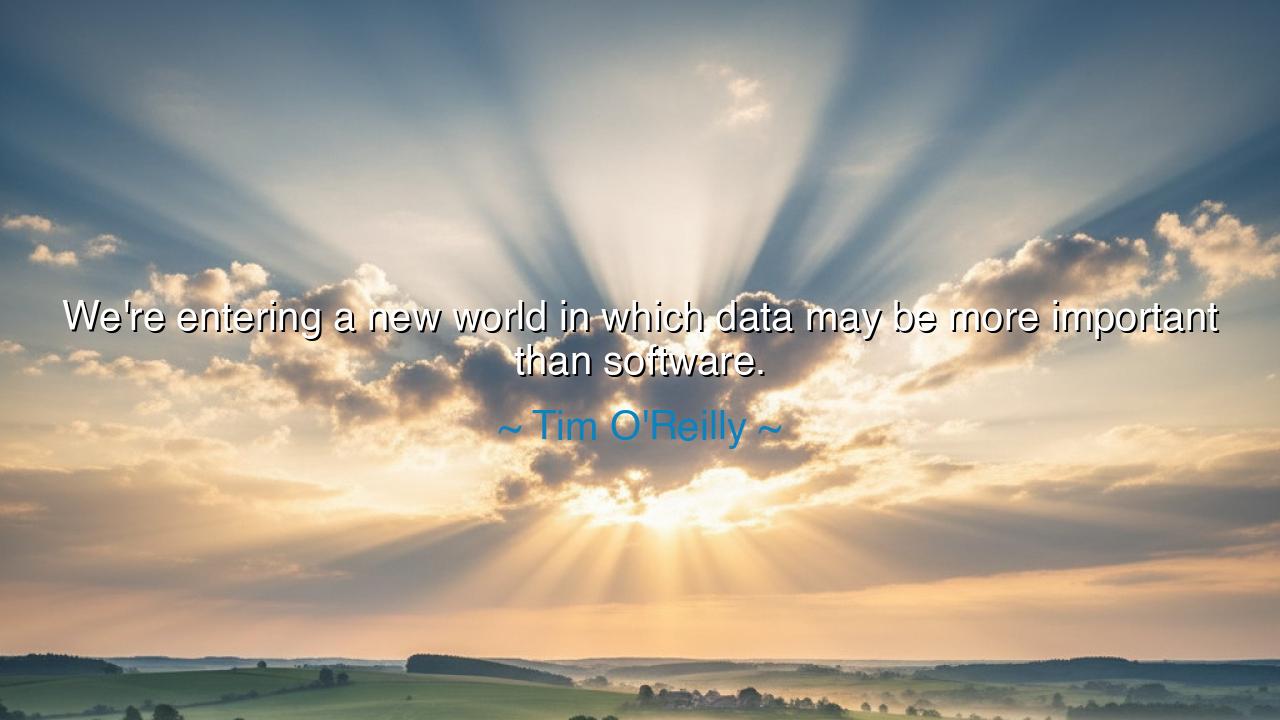
We're entering a new world in which data may be more important






Tim O'Reilly's words, “We're entering a new world in which data may be more important than software,” strike a powerful chord, ringing through the halls of human progress and innovation like the call of a herald, announcing the dawn of a new era. In this proclamation, O'Reilly beckons us to witness a profound shift in the landscape of technology—a shift where data, not software, takes center stage as the key to unlocking the future. Just as the ancient philosophers and mathematicians were once entrusted with the wisdom of the stars and geometry, so too do we, in the modern age, find that the truth of the world lies not in the programs and machines we create, but in the vast oceans of data that they produce.
To understand the magnitude of O'Reilly’s words, we must look to the very nature of data itself. It is not simply a collection of numbers or facts, but the very fabric of modern existence. It is in the streams of data that flow from our every interaction—from the devices we carry, to the systems we use, to the interactions we have with others—that the true nature of our world is revealed. Software may give us the tools to manipulate this data, to arrange it into patterns we can understand, but it is the data itself that holds the meaning, the insights, the power. Just as the ancients read the stars to understand the patterns of the heavens, so too must we now learn to read the vast cosmos of data that governs our world.
Consider the story of Archimedes, who famously shouted “Eureka!” upon discovering the principle of buoyancy. In that moment, Archimedes did not simply create a theory; he discovered the truth hidden in the natural world. This was not a creation born of software, but of an understanding of the data embedded in the material world around him. Similarly, today, we are beginning to see that the power to understand and influence our world does not rest solely in the software we design, but in the data we gather. Data is the new treasure—the new key to unlocking the mysteries of not just the physical world, but of human behavior, social systems, and the very fabric of society itself.
In the past, the ancients sought to understand the world through the tools they had at their disposal, whether it was the compass, the astrolabe, or the printing press. With each new tool, they gained greater access to the mysteries of the world. But as time has passed, the tools we use have become more complex, and the data we generate has grown exponentially. In this age, the software—once seen as the pinnacle of human achievement—now plays a secondary role. Just as the printing press once revolutionized the way knowledge was shared, data now has the power to revolutionize the way we understand and interact with the world.
This shift in focus from software to data brings to mind the story of Isaac Newton, who discovered the laws of motion not by simply building upon the work of others, but by gathering and interpreting data. Through his insights, Newton saw the world not as a series of isolated events, but as an interconnected system governed by laws—laws that could be understood through careful observation and analysis of the data around him. Just as Newton saw the world differently by interpreting data, so too must we now recognize that the true power of modern technology lies not in the code we write, but in the data we collect and how we use it to understand and shape the world.
Yet, this shift brings with it a challenge. As O'Reilly notes, the world of data is vast and complex—and with its power comes the responsibility to wield it wisely. Like the ancients, who feared the consequences of knowledge misused, we must approach this new world with wisdom and humility. Data, if left unprotected or misinterpreted, can be a dangerous force—capable of shaping not just business, but society itself. Just as Plato warned against the unchecked use of power in his works, we must ensure that data serves the greater good, not the interests of the few. It is not enough to have access to vast amounts of data; we must ensure that it is interpreted correctly and used for benevolent purposes.
Lesson for the ages:
The true power of our age lies in the ability to gather, interpret, and act upon the data around us. As O'Reilly suggests, data is no longer merely a byproduct of technology, but its very essence. It is the key to unlocking truths about our world, about human behavior, and about the systems that govern our lives. But with this power comes great responsibility. As the ancients once revered knowledge, so too must we reverently approach the data that now shapes our world, using it not for the benefit of a few, but for the upliftment of all.
Practical Action:
In your own life, embrace the power of data. Whether in business, science, or social justice, seek to understand the data around you, and use it to uncover truths that can lead to progress. But as you do so, remain vigilant—ensure that the data you use is interpreted with wisdom, and that it is directed toward good. Just as the ancients wielded their knowledge with care and purpose, so too must we ensure that data is used to shape a world that reflects the best of humanity—a world that values truth, justice, and compassion.






AAdministratorAdministrator
Welcome, honored guests. Please leave a comment, we will respond soon